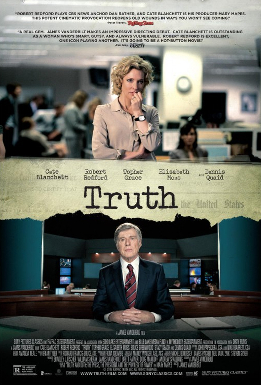A newsroom drama detailing the 2004 60 Minutes report investigating then President George W. Bush's military service, James Vanderbilt's Truth is an adrenaline rush that quickly turns into a uncomfortable drumming. And while the film itself isn't one of remarkable attributes, a truly mesmerizing performance by Cate Blanchett as producer Mary Mapes will keep you engrossed from start to finish.
Beginning with a reception honoring the work of news anchor Dan Rather, Truth works hard to set the stage for what will quickly become a battlefield as Mapes works to bring a difficult story to the television sets of the American people. And while director James Vanderbilt meticulously drops clues as to the events that lead up to that fateful telecast, you can't help but be slightly confused as to the journalistic misjudgment showcased by such a highly regarded veteran.
Sifting through the overdramatized storyline, you can't deny that Blanchett is complete and utter perfection. Fully embodying her portrayal of Mapes, the two-time Oscar winner is able to showcase the producer's treacherous fall with an even sense of grace and fear. She reveals so much about her character through non-verbal tidbits, utilizing her body language and forcing viewers to pay attention as she leads them down a dark road, revealing the unfortunate transition that has occurred in the world of television news.
With most of the story taking place within the confines of a newsroom, it is no wonder that the film occasionally falls victim to itself, suffocating us in facts and information. If anything, this personifies the mountain of intelligence and knowledge that one must sift through in order to get a bare glimpse at the truth. But nevertheless, I'd be lying if I didn't say that the film hits roadblocks with its heavily loaded dialogue. The result is a sense that we are being preached at for a sin that we aren't entirely sure we committed.
That begin said, Truth does come into itself during its third act. While I can't fully explain how it all happens, the story matures into a sharp, cohesive bit, and we are finally given something far more compelling than what we have laid witness to over the previous ninety minutes. I'm not sure if it all centers around Blanchett's pulse-pounding monologue that closes out her hearing before the investigative committee or not, but somewhere the mood and approach changed. And while it doesn't make the film perfect"¦it does allow you to leave the theater on a high note.

